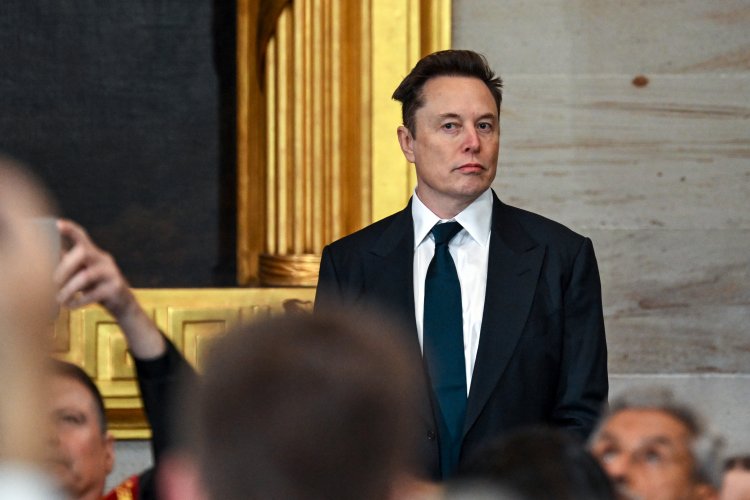Musk's Mockery of Navarro Reveals Further Division Within Trump's Coalition
The conflict among the men in the juvenile feud serves as a stand-in for deeper rifts within President Donald Trump’s MAGA coalition.

The two prominent figures—a billionaire known for his late entry into Trump’s sphere and a staunch trade protectionist with an unwavering loyalty to the president, even to the extent of serving time in prison for him—engaged in a weekend spat that escalated into a crude social media exchange on Tuesday. Musk, through a series of posts on X, labeled Navarro “dumber than a sack of bricks” and publicly mocked him with the name “Peter Retarrdo,” taking issue with Navarro’s credentials, including his Harvard Ph.D.
While the feud may seem trivial, it symbolizes deeper ideological rifts within President Donald Trump’s coalition. This coalition, which formed in November to support Trump, comprises a diverse array of individuals with differing, and often conflicting, motives, many of which are highlighted amid the current tariff debate.
Within this coalition are longstanding MAGA supporters who were involved during Trump’s first term, like Navarro; a group of conservatives distrustful of Washington, Wall Street, and any establishment that opposes their agenda; and various MAGA influencers who thrive on the chaotic aspects of Trump’s attempts to disrupt the status quo. Additionally, there are newer MAGA enthusiasts, including Musk and tech leaders like Marc Andreessen, along with figures such as Dave Portnoy and Joe Rogan, who joined the movement believing Trump would enhance the economy and address cultural issues sensibly, while some sought to elevate their personal brands or businesses.
The divisions within this coalition are not clear-cut, but they are becoming more pronounced due to Trump’s trade war, particularly among those witnessing declines in their stock portfolios.
“It was always kind of obvious that there were some tensions in the New Right-tech coalition that were eventually going to come to the fore,” remarked Abigail Ball, executive director of American Compass, a think tank associated with Vice President JD Vance and Secretary of State Marco Rubio. “And I think [the Musk-Navarro spat] is the first real example of that.”
On Tuesday, White House press secretary Karoline Leavitt acknowledged the disagreement between Musk and Navarro but downplayed its significance.
“These are obviously two individuals who have very different views on trade and on tariffs. Boys will be boys, and we will let their public sparring continue,” she stated, adding that it “speaks to the president's willingness to hear from all sides.”
As Trump appeared to be fully committed to his “no negotiations” stance on tariffs, a substantial segment of his supporters—from both old and new MAGA—watched in dismay, confronting the tangible consequences of the policies. Veteran Trump supporter and hedge fund manager Bill Ackman suggested that the new tariffs marked the onset of an “economic nuclear war.” Meanwhile, Musk expressed a desire for a “zero-tariff situation” between Europe and the U.S., and Portnoy, a notable Trump supporter for the 2024 election, criticized the tariffs during a Monday livestream, using Barstool Sports to illustrate his point.
“This economy tanks. Our advertisers who do business overseas and sell products and advertise with us, they sell less products. It gets more expensive. What’s the first thing they cut? Ad budgets. Ad budgets that we get. Suddenly we’re not getting as much money,” Portnoy explained. “Suddenly I have to fire Nate and lay people off. That’s how it works.”
Other financial leaders, like JPMorgan Chase CEO Jamie Dimon, warned that tariffs would “increase inflation and are causing many to consider a greater probability of a recession.” Several GOP lawmakers, worried about the potential impacts of economic instability on upcoming midterms, have sought to reassert their influence on tariff discussions.
Privately, even some individuals close to the White House, who endorse the president's approach to establishing fairer trade relationships, expressed concern that the tariffs were too aggressive.
“If you look at Peter Navarro, he wants to develop everything in-house. He doesn’t want to rely on China for anything… But we’re 15 years away from having a chip industry that can supply our needs,” said one White House associate, speaking anonymously.
As of Sunday, Trump dug in his heels on the no-negotiations messaging, likening the tariffs to “medicine” necessary for healing the economy after years of trade imbalances. On Monday, he labeled those anxious about market fluctuations “Panicans,” a term his most committed online supporters quickly adopted, suggesting those worried about the tariff policies simply needed to toughen up.
“Trump is now upending global economics and waging war on the globalists on behalf of the American Worker,” influential MAGA podcaster Jack Posobiec tweeted on Monday. “The Golden Age is on the other side - the new American Dream. Welcome to the Great Deal.”
On Monday, Trump announced a willingness to negotiate, providing relief to many in the MAGA base who hoped for potential deals with foreign leaders. By Tuesday, his team had confirmed ongoing negotiations with Vietnam, Japan, and South Korea, with nearly 70 countries expressing interest in dialogue, as noted by Leavitt.
One Trump ally, speaking anonymously to share insights on the administration’s communication strategy, indicated that Treasury Secretary Scott Bessent is “the best messenger for Trump” on tariffs because he can advocate for the policies while emphasizing the potential for negotiations to resolve them.
“The message isn’t like, ‘Fuck you, pay up,’” the individual asserted. “What he is doing is spinning the message in more of a positive light, which is, we can get a deal done here that helps America, get a deal done with our allies, and move on from this.”
Wall Street seemed reassured by Bessent’s fresh messaging on Tuesday morning, although it took a downturn later when it became apparent that considerable tariffs on China were set to be implemented the following day. Bessent, a former hedge fund manager, has generated hopes for Wall Street, but Trump’s affinity for tariffs complicates his ability to fully mitigate the president's larger agenda.
“Bessent seems to be giving Trump the best political and economic advice this week,” noted Scott Reed, a GOP strategist.
Nonetheless, uncertainty remains about whether Trump will ultimately pursue these negotiations, while the range of tariffs will remain in place for the time being, set to commence tomorrow. On Tuesday morning, Ackman took to X to again advocate for a pause on the tariffs for 30, 60, or 90 days, suggesting such a delay would “enable negotiations to be completed without a major global economic disruption that will harm the most vulnerable companies and citizens of our country.”
Meanwhile, the MAGA online community appeared largely unaffected by the potential change in the White House's messaging on Monday, instead asserting that the market's positive response on Tuesday had merely validated Trump's positions.
“Look at all that green,” Trump influencer Benny Johnson posted on X, sharing a picture that showed rising stock values on Tuesday. “It’s a good day to not be a Panican.”
Anna Muller for TROIB News
Find more stories on Business, Economy and Finance in TROIB business












